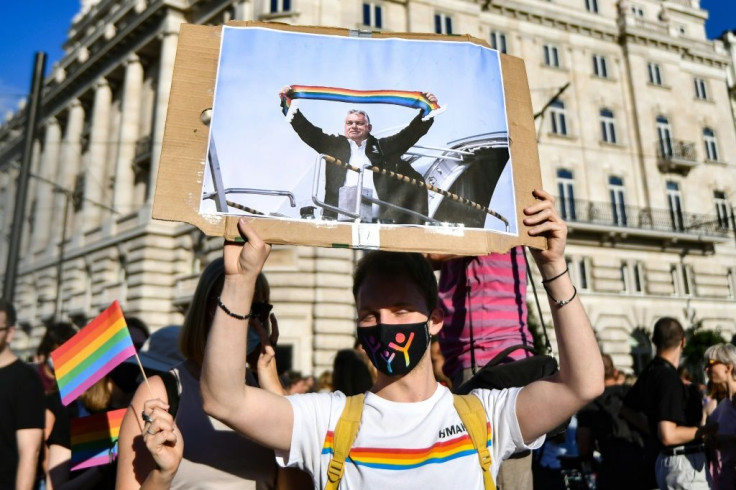EU Warns Hungary To Fix Anti-LGBTQ Law Or Face Action
European Commission chief Ursula von der Leyen on Wednesday warned Hungary to reverse course on its controversial LGBTQ law, as pressure mounted on Brussels to cut EU funding to Budapest.
But a government spokesman insisted they would press on in spite of what he said was the Commission's "unprecedented" interference in the country's internal affairs.
Hungary's strongman Prime Minister Viktor Orban is growing international protest over the law, which is due to take effect on Thursday.
While Orban insists it is a measure to protect children, critics say the law conflates paedophilia with homosexuality and stigmatises support for the LGBTQ community.
Now, Brussels is considering legal action against the EU member state, and may also link payment of post-Covid recovery funds to the law's repeal.
"It is a disgrace this legislation... It is something that flies in the face of the values of the European Union," von der Leyen, who heads the EU executive, told the European Parliament in Strasbourg.
"If Hungary does not rectify the situation, the commission will use its powers available as the guardian of the treaties."
Orban's cabinet chief shot back, denouncing an "unprecedented campaign".
"No matter that Brussels wants to let LGBTQ activists into kindergartens and schools, we refuse to do so," Gergely Gulyas told a press briefing in Budapest.
Hungary has for years defied the EU with authoritarian laws that critics say have undermined free speech and threatened the independence of the country's judiciary.
Although the European Commission launched several legal procedures against Budapest, including a threat to strip it of EU voting rights, they have failed to stop Orban's defiance.
The latest dispute is over a law, the "Anti-Paedophilia Act", that was originally billed as toughening punishments for child abuse.
Its final draft however contains amendments that include a ban on the "display or promotion" of homosexuality to under-18s, and restrictions on sex education as well as media content.

"Europe will never allow parts of our society to be stigmatised, be it because of whom they love, because of their age, their ethnicity, their political opinions, or their religious beliefs," said von der Leyen.
Her position is backed by most member states. Led by Netherlands, leaders at last month's EU summit upbraided Orban over the law.
"Our conversation was necessary, difficult, and at times emotional," EU Council chief Charles Michel, who hosted the summit, told MEPs.
The commission is understood to be planning an infringement proceeding, which amounts to a lawsuit over failure to implement EU law that can lead to fines inflicted by the bloc's top court.
But MEPs have called for the commission to go further. They want it to use its new powers to withhold coronavirus pandemic recovery cash when violations of EU values are proven.
These powers over the purse-strings were part of a great compromise landed by EU leaders last year when agreeing the bloc's 750 billion euro ($900 billion) pandemic recovery fund -- and were fiercely resisted by Orban.
"We want the EU money to reach the Hungarian people and avoid reaching the Orban family pockets," said Hungarian MEP Katalin Cseh.
Paolo Gentiloni, the EU's economic affairs commissioner, said that the matter had not yet been decided.
talks with Budapest were still ongoing over whether to approve Hungary's seven-billion-euro plan for how it will spend its EU funding, he said.
Those discussions included questions over Hungary's commitment to fighting corruption, and to ensuring both transparency and the independence of the courts.
MEPs mostly backed von der Leyen's tough words for Orban and her threat of legal proceedings. They are expected to pass a resolution on Thursday asking the commission to cut off funding to Hungary.
But some far-right lawmakers, a substantial political force in the European Parliament, back Orban.
French MEP Nicolas Bay of Marine le Pen's far-right National Rally party called the targeting of Hungary "scandalous".
"Hungary wants to protect its children against the delusion of gender theory," he said. "Budapest is right."
© Copyright AFP {{Year}}. All rights reserved.





















